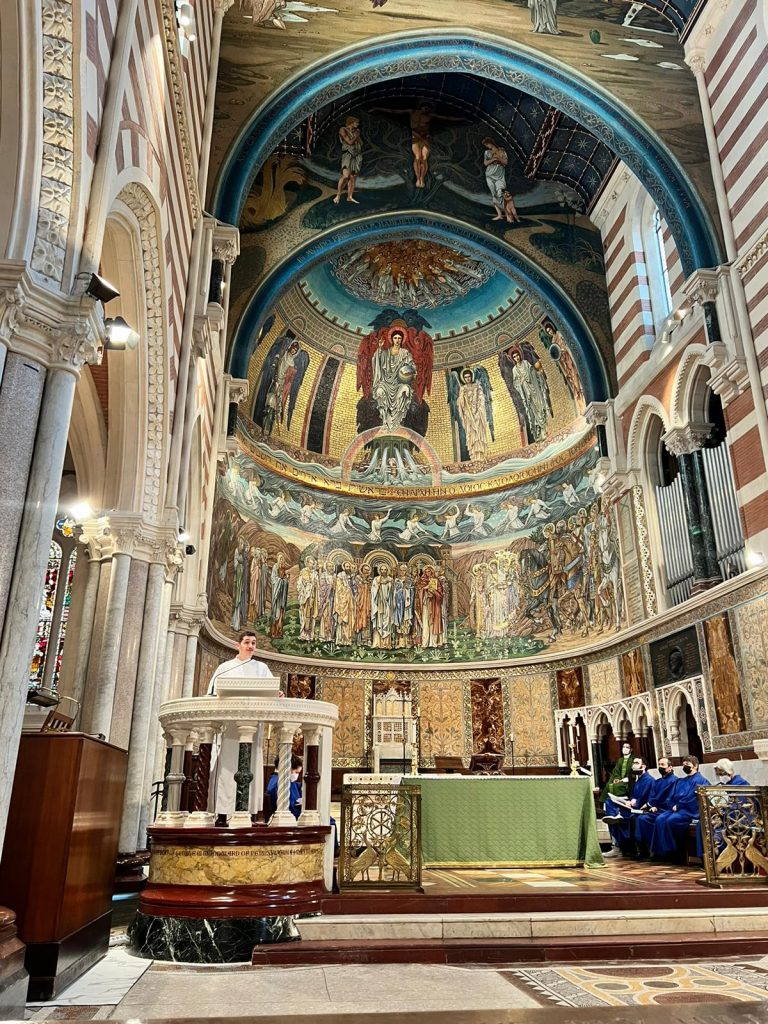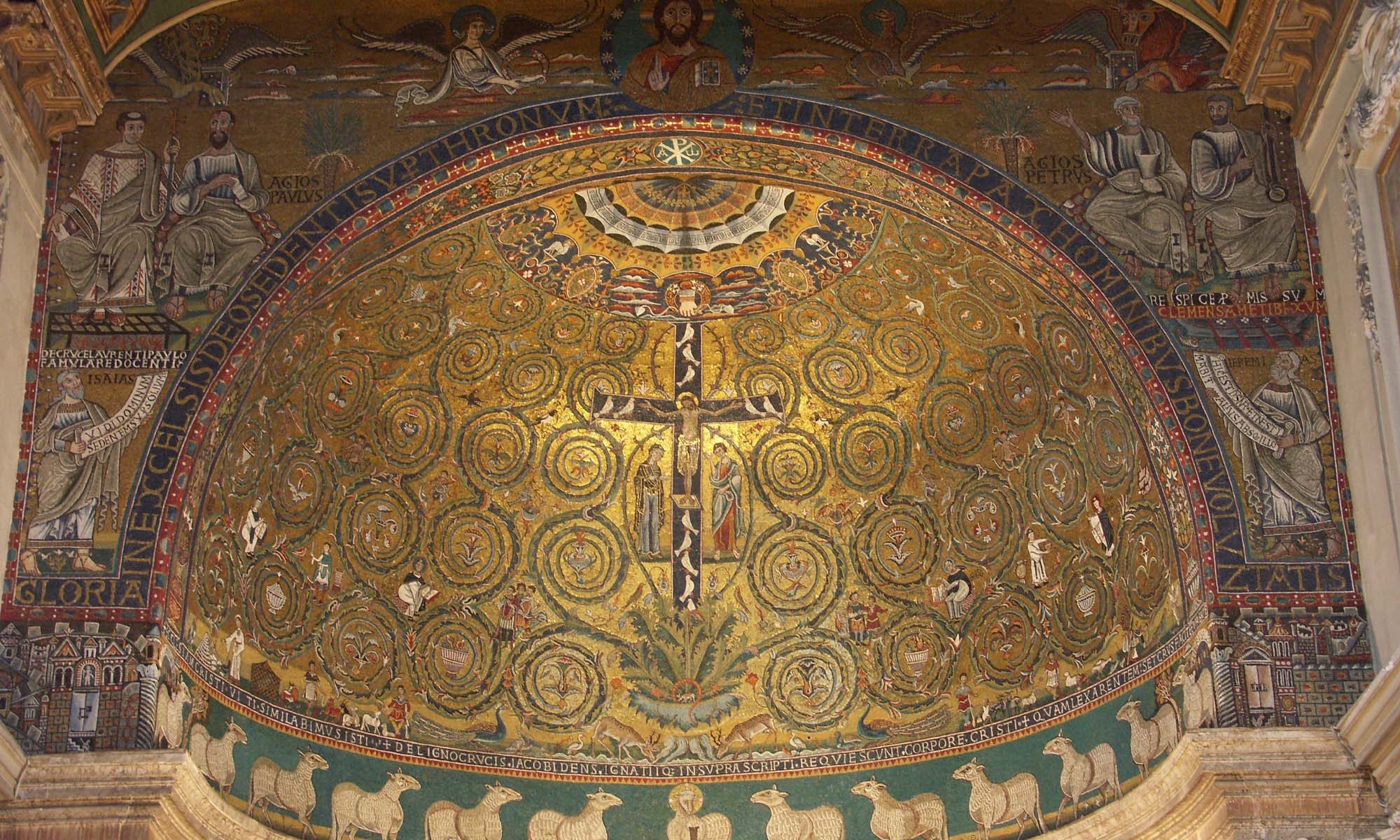I was given the opportunity to preach during Sunday Eucharist at à St. Paul’s yesterday. This Sunday was also a milestone in the history of the church community because it was Fr. Austin’s 10-year anniversary at St Paul’s.
You’ll find below the text of the sermon in English as well as the audio recording.

February 13, 2022
Epiphany VI: St. Paul’s-within-the-walls, Rome
Readings: Jeremiah 17:5-10; Psalm 1; 1 Corinthians 15:12-20; Luke 6:17-26
As a young preacher and a newcomer among you, I am anxious to be relevant, more than I probably should be. It is said that congregations like relevant sermons. The Merriam Webster dictionary defines relevant like this: “having significant and demonstrable bearing on the matter at hand” but also “having social relevance.” As we don’t know each other you can legitimately wonder how this young French chap could have “social relevance” to preach to us whom he barely knows, in a city he arrived in a brief month ago? I wondered the same thing myself when I started writing this sermon. The Bible gives us more than one example of the fact that relevant public addresses breathed by the Spirit of God (what in church-speak we call sermons) do not depend on a sociological knowledge of the audience. Nor do they on the status, education, or skills of the preacher. How comforting! Especially today when I am filling the pulpit after Jesus Christ himself!
In the Gospel it was indeed Jesus that we heard preaching to us today. This passage is often referred to as the “sermon on the plain” because Jesus comes down from the Mount of Olives to address his disciples, and (it is implied) also to address the crowd and the great multitude that has come to follow him. If Jesus’ sermon is pretty much unlike what a priest would dare to preach, this crowd however is pretty much like us here this morning. It is a composite and cosmopolitan mix of people: “A community of followers who were strong and people who were weak, a community that had people who were faithful and people who were without faith, people who were rich and poor, people who got healed and people who longed to be healed…[1] ” They came, like we do, from different regions, had different mother tongues and different walks of life. This crowd was probably always changing, people coming and leaving, and many amongst this multitude didn’t share Jesus’ Jewish culture. How could someone’s teaching be relevant to such a multitude? How could he speak both to the Judean, the Jerusalemites and the inhabits of the coast? How could he be meaningful to his close disciples as well as to people he is meeting for the first time?
And yet, the way Jesus preaches to this mixed multitude is infinitely relevant, even to us today, in a country he never visited. If it is so relevant, it is because he doesn’t preach it from his own self, but as he often says in the Gospel, from the communion of love he shares both with his Father, and with us, his brothers and sisters. Jesus is relevant because he relates us to each other and to the Father. No ideology, no method, no self-absorption hinders the stream of Jesus’ words that water us all. The four blessings and the four woes he announces to the multitude flow from the same source: they all manifest Jesus’ power to release, or “unstick” those who identify themselves with what they are not. Are you suffering? Take heart, your suffering is not who you are called to be. Are you contented? God has something better for you, your content is not who you are called to be either. But the blessings and woes of Jesus do more than that, they do more than point to our individual selves, leaving each one of us sort out our problems on our own. The symmetry of these blessings and woes invites that crowd – just as it invites us today – to see them as intimately related, to see each other’s needs and gifts as mutually interdependent. If you are, or haveso much, you can give more to others and be more present for them. I you have little and are little in the world’s eyes, you can receive even more and teach better than anyone else how to be grateful. In Jesus’ words, blessings and woes in this world are reconciled to foster healing, just like the miraculous healings of the sick are signs of God’s power and his coming Kingdom.
Jesus makes us relevant for each other, just as his death and resurrection is relevant for all of us, as saint Paul insists. If we treat each other as derisory or irrelevant, we do not believe in Jesus’s relevance, nor in his power to heal this world. Jesus himself never tells anyone that they cannot follow him, that they don’t matter. He tells no-one that they’re not relevant. And what is more, as they follow him together on the way, they’re also invited to follow each other; to see each other’s relevance. That’s the way that a crowd journeys forward and you can observe the same thing with groups of tourists in Rome: even if you are following one guide, you all end up walking one after another, sometimes ahead, sometimes beside, sometimes a bit behind, but never alone.
These people in the plain are given the opportunity to follow Jesus, just like those of us who are here. If we keep showing up, if we keep joining in this crowd, the gap between the blessings and the woes will get smaller. The gap between you and me will get smaller, between each other and between Christ and us too. All of the sermons that Jesus gives in Luke’s Gospel tell us this. Showing up is as relevant and radical as Jesus’s presence among us. Show up, consistently; build the Kingdom.
When you came to gather like that crowd, when you showed up this morning, you probably expected to hear God’s Word shared from someone whose voice you know. Certainly not from me, naturally, as we don’t know each other well. I am talking of Fr Austin, your Rector, who is not on this mountain today, but at a “level place” like Jesus when he addressed his disciples and healed the crowds! Today we celebrate Austin’s 10-year anniversary at St. Paul’s. Those ten years when he has been here for you. Those ten years when he has guided an ever changing and moving crowd of followers of Christ in this city of Rome. Ten years when he has held together in God’s care and prayers such a diverse community as all of you who are here in person or through the internet. Ten years when he has been present to those who are now absent. Ten years when he has shown everyone’s relevance to each other as they advance together the Kingdom of God in Rome, while at the same time sustaining the complementary ministries of the Church and the JNRC. And ten years too during which you, Austin, have given yourself to this people. If you need proof of what I’m saying, all you need to remember is that you now speak Italian like a true Roman gas station attendant, come un benzinaio vero! You’ll never run out of gas. All of these quiet efforts the Psalmist likens – in a more ecological way – to a tree silently but surely growing roots and branches for people to rest under its shade. Even when the floor seemed covered in snow like the first day you arrived in Rome, deep under this ground, the Lord was making your roots reach his well-spring of life. Everything that you’ve done has been relevant in God’s eyes and in the sight of the people to whom you’ve ministered, though both woes and blessings.
I have not been here for long, but I remember what Austin told me on our first passegiata together, over a month ago. It was the first sermon I heard about the church in Rome which is no small thing! I think it is very relevant to share it with you this morning so that you get three sermons for the price of one: a great cloud of starlings was dancing in the Roman sky, and Fr Austin likened them to the Church, to a beautiful congregation. In their dance, each and every starling is relevant. They show up and fly together in the breeze for all the world to see, and to give thanks to God.
[1] The Rev. Teddy Hickman-Maynard, “Following without Faith,” The Memorial Church, Harvard, 26 Oct 2021.

